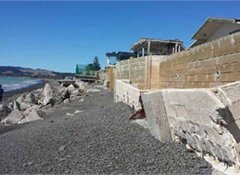Home : Research Results : 38% underestimating sea level rise
Research Results
38% underestimating sea level rise
14 Jul 21

Many New Zealanders (38.2%) underestimate current and projected sea-level rise.
A Horizon Research survey of a representative sample of 1100 New Zealanders aged 18 and over, conducted for the SeaRise project at Victoria University, also shows a similar proportion (35%) overestimate it.
Only about about a quarter (26.9%) are in line with current understanding of sea-level rise.
Respondents were thus asked to identify, from options ranging from ‘not at all’ to ‘more than 40 cm’, how much they thought global sea level has risen since 1900.
In their published paper on the findings they say:
More than a quarter of respondents answered ‘10–20 cm’ (26.9%), a figure that is in line with current understanding of sea-level rise to date.
But a larger proportion (38.2%) of respondents either underestimated the amount of sea-level rise, selecting ‘not at all’ (11.2%) or ‘5–10 cm’ (27%), or overestimated (35%) the amount of sea-level rise from 1900 to date, selecting ‘20–30 cm’ (13.4%), ‘30–40 cm’ (8.4%) or ‘more than 40 cm’ (13.2%).
Knowledge of sea-level rise projections to 2100
While a minority (6.8%) of respondents said that sea level was not projected to rise by 2100, nearly 75% of respondents selected options that were in line with scientifically-plausible projections, selecting ‘up to 40 cm’ (28.6%), ‘up to 1 m’ (30.9%), and ‘up to 2 m’ (14.9%).
But a large group of respondents (18.9%) overestimated sea-level rise projections to 2100, selecting ‘up to 5 m’ (10.7%) or ‘more than 5 m’ (8.2%).
Causes of sea-level rise
Respondents were also asked to identify and rank the major causes of sea-level rise from a ten-item list that included melting ice sheets, melting land-based glaciers, melting sea ice, thermal expansion, and land subsidence.
No definitions of these phrases were provided as the researchers' intention was to gauge people’s understanding of sea-level rise from existing sources of information, such as the media.
While climate scientists and the media make efforts when communicating with publics to not identify melting of Arctic and Antarctic sea ice (which is widely covered in the media) as causing sea-level rise, 28.7% of respondents identified this as their top ranked cause of sea-level rise.
Encouragingly, other respondents’ top ranked causal mechanisms that do contribute to sea-level rise, selecting melting ice sheets (24%), thermal expansion of the oceans (7%), and melting of land-based glaciers (4.2%).
The researchers say:
Respondents who overestimated the amount and speed of sea-level rise were more likely to express greater concern. But concern is not always helpful.
A focus on extreme (and often unsound) projections of sea-level rise can lead to more anxiety instead of greater motivation to act.
Nevertheless, our research shows New Zealanders are aware of, and concerned about, 21st-century sea-level rise, which is already affecting coastal communities and infrastructure.
More detail:
HorizonPoll Online Survey system
and website developed by BEWEB
Copyright © 2010. HorizonPoll incorporating ShapeNZ - Listening to New Zealand


